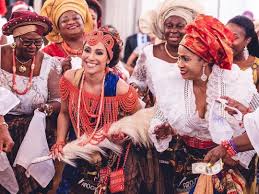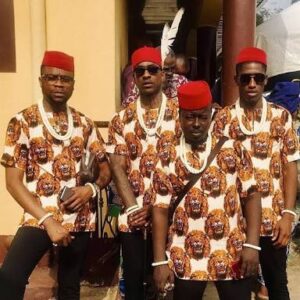Parents value the name they choose to give to their newborn because there is a belief that the name one bears directly influences the life path of an individual. Some schools of thought would argue that the stars and the universe align in synchronization to detect the course of events in the life journey of an individual as there is this general saying in Igboland that “Aha onye na-edu ya” which means that the name one bears leads him in the journey of life.
The Naming Ceremony in Igboland involves a beehive of activities before the day, which sometimes lingers after the ceremony. When the new baby is born, the father sets out on an investigative mission to find out the ancestor that re-incarnated and the traits associated with this person in his former life. The mother’s experience during pregnancy may also determine her name for the baby. The naming ceremony in Igboland is always joyful and a time when people show goodwill to the newborn.
In Igbo culture, the naming ceremony is not just a formality; it is a deep-rooted tradition that symbolizes the identity of the child and the joy of the family
Preparation For The Naming Ceremony
The Families gather to discuss the name that will be given to the child, often considering the circumstances of the birth, family history, and meanings behind potential names. It is common for names to reflect the hope of the family and aspirations for the child. For instance, a name might express gratitude for safe delivery or signify the desire of the family for the child to achieve greatness.
The Ceremony Day
On the day of the ceremony, family and friends come together, transforming the home into a vibrant celebration space. Traditional attire is worn, showcasing the rich fabrics and colors that embody igbo culture. The atmosphere is filled with laughter, music, and the aroma of delicious dishes being prepared.
The naming ceremony typically involves the father, who formally introduces the child to the gathered guests. A designated elder, often a respected community member, plays a crucial role in the proceedings. This elder leads the prayers and blessings for the child, calling on ancestors to guide and protect the newborn
Naming and Relevance
The actual naming is a moment filled with emotion. The chosen names are announced, often accompanied by explanations of their meanings.
Each name given to the child carries weight and significance, representing cultural heritage, family legacy, and personal aspirations. Guests may also present gifts, such as money, clothes, or traditional items, which further symbolize their support and blessings for the child
What makes the naming ceremony particularly special is the sense of community. it is not just a family event; it is a communal celebration. Neighbors and friends come to share in the joy, reinforcing social bonds and community ties. This aspect reflects the Igbo belief in communal living, where everyone plays a role in nurturing the next generation.
Some common names given to newborns during naming ceremonies in Igboland, along with their meanings are; For the males, they are given names like Chinedu ( God leads) Obinna (Father heart), Ifeanyi ( Nothing is impossible with God), Kelechi( Thank God), Nneka ( mother is supreme), Ifeoma ( Good thing), Amarachi ( Grace of God), Chidimma ( God is good), Ugochi ( Blessings of God)
Family heritage, Circumstances of birth, Spiritual Significance, Cultural traditions, Consultation with the elders, Gender considerations, and Community input are some traditional methods and considerations involved in choosing names for newborns.
Traditional Attire For Naming Ceremony in Igboland
The traditional attire worn during a naming ceremony in Igboland is a vibrant and essential aspect of the celebration that reflects the community’s rich cultural heritage, showcasing rich textiles, colors, and intricate designs. Each outfit carries significant meaning

Women typically wear colorful wrappers known locally as George or Akwette. These wrappers are crafted from beautifully patterned fabrics and wrapped around the waist in various styles. They are often accompanied by a matching blouse, which is frequently embellished with intricate designs, showcasing the artistry and creativity of local artisans.
A hallmark of their attire is the head tie or Ikwor, which is an important accessory that adds elegance to the outfit. These head wraps can be styled in elaborate ways and are often made from the same fabric as the wrapper or in contrasting colors, highlighting the personal style and cultural significance of the wearer. Jewelry complements the attire, with traditional pieces like coral beads being popular.
Attire for men during naming ceremony in Igboland

Men usually wear a traditional shirt called Isi Agu, characterized by its bold patterns and colors that may represent specific cultural symbols. This shirt is paired with tailored trousers that can be plain or patterned, ensuring a cohesive appearance.
Another important element in their attire is the okpu agu, a traditional cap that signifies respect and cultural identity. This cap often matches the shirt in color and design, creating a unified look to their heritage.
Attire for children during the naming ceremony
Children are also dressed in colorful traditional outfits reflecting the vibrant styles and cultural heritage of the Igbos. The boys dress in similar traditional outfits as the men with few exceptions like red caps and tusks. The girls likewise dress in similar attire as the women.
Cuisine served during the naming ceremony
The cuisine served during the naming ceremony in Igboland is a vital aspect of the celebration, showcasing the Igbo people’s rich culinary traditions and communal spirit. The dishes prepared are not only delicious but also steeped in cultural significance, symbolizing hospitality and joy. Traditional dishes include Abacha, Nkwobi, Achcha, Akidi, Jollof Rice, Onugbu soup, Ewa Soup, Pounded Yam, Pounded cassava, Egusi soup, Ukwa, Fried fish, Palm wine, Zobo
Traditional Music, Local chants, Dancing, Jubilation, and presentation of gifts mark the end of the ceremony. Excitement fills the air as the Umu Ada and other women’s groups sing and dance in admiration of the guests.
Conclusion
The child naming ceremony in Igboland is symbolic and revered in the Igbo tradition because of its cultural significance. This event emphasizes the importance of names, which carry significant meanings and hopes for child’s future. I find this ceremony deeply moving, as it beautifully encapsulates the values of heritage and identity, reminding us of our roots and the collective joy of welcoming new life into our midst.
